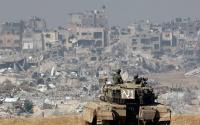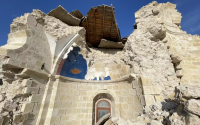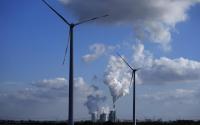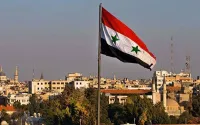And police found at least 40 corpses in the town of Balad and close to another 30 in Baghdad, in an apparent fresh wave of sectarian killings.
Earlier in Baghdad, two bombs hit the convoy of a senior interior ministry official, killing seven people.
Iraq has seen a surge of violence in the Muslim fasting month of Ramadan.
In other developments:
Prime Minister Nuri al-Maliki said the government was "determined to disband" militias in Iraq - many of which are blamed for sectarian violence - in a televised speech on the one-year anniversary of a referendum on the country's constitution
A coalition of Sunni Muslim insurgents, the Mutayibeen Coalition, released an internet video statement proclaiming an independent Islamic state covering Baghdad and several other provinces stretching as far north as Kirkuk It was announced that five US soldiers died on Saturday - four in two incidents in Baghdad, the fifth in Falluja to the west.Students killed
In Kirkuk, police say the series of attacks injured more than 70 people.
Several of the attacks involved car bombs, some of which were detonated by suicide attackers, police said.
 |
Another bomb targeted the local headquarters of a security agency that protects government installations, but hit a training college for female teachers, killing two students, police said.
"A suicide bomber blew himself up as the girls were leaving the school. Two of them were completely burned in the flames," Brigadier General Adel Ibrahim of the Kirkuk police told AFP news agency.
Security operation
The city police chief is believed to have been the target in one case, although it is not clear whether he was in the area at the time.
 Senior official Hala Shakr Salim survived the attack in Baghdad |
Many people were arrested and stores of weapons confiscated.
But the BBC's Andrew North in Baghdad says that bloodshed often resumes as soon as such operations wind down.
Kirkuk has large populations of Kurds, Arabs and Turkmen, is located in the main oil producing region in northern Iraq, and has often been hit by violence in the last three years.
Sectarian killings
There has also been a spate of sectarian killings over the weekend in the town of Balad, 80 km (50 miles) west of Baghdad.
A curfew has been imposed after the bodies of at least 40 Sunnis were found, two days after at least 14 Shia workers were discovered beheaded.
Angry residents have been roving the streets of Balad, armed and reportedly rounding up any Sunnis they find, according to local authorities.
In Baghdad, Sunday's bombing killed four passers-by and three security men.
The interior ministry's head of finance, Hala Shakr Salim, survived the attack on her motorcade as it drove through the eastern district of Mustansiriya.
Police also said they had found almost 30 corpses dumped across Baghdad during Sunday, including two pulled from the River Tigris.
The BBC's Jim Muir in Baghdad says that although violence has increased during Ramadan in recent years, all types of attack are at record highs since the US-led invasion in 2003.






